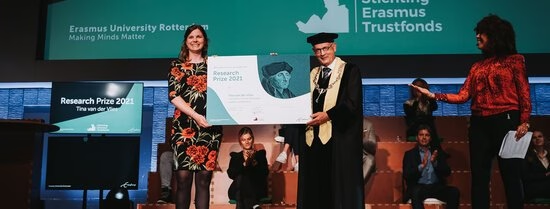Tina van der Vlies examines how history education plays a role in how we view society and why the way we learn and talk about our history has changed over the years.
Tina van der Vlies examined national history narratives between 1920 and 2010 in English and Dutch history textbooks. She also analyses patterns and developments in the public debate on history education between 1920 and 2020. Tina van der Vlies' work has become important to policymakers and educators because her research sheds new light on current social debates in the Netherlands and abroad.
History is connected to the present
Van der Vlies: "When we think of history, we often think of stories from a different time, when other people were involved. Something we are not so familiar with nowadays. But if we learn more about history and examine long-term developments, we can better understand why things happen and place them in the current context. Here in the Netherlands, but also in the rest of the world. In society, discussions about history are often heated, emotional and polarising, because our vision and ideas about the past are connected to those about the present and the future. It is about identity, values and citizenship. We see this, for example, in the discussion about statues, but also in historical narratives in school textbooks: selected images about the past that are disseminated to the next generations. I think it is important to add knowledge and background information to the current social debate in order to promote a substantive discussion. This not only enables us to better understand current developments, it also has potential to defuse current explosive discussions."
A better understanding of the world
Through what we hear and read about the past, we form an image and memory of what our national history has been like and what significance this past has had. The way we look at history plays a role in how we look at contemporary issues. Van der Vlies therefore includes both England and the Netherlands in her research: "For example, both countries have a colonial past and a population that has become increasingly culturally heterogeneous, but both countries have a different history. The Netherlands, for example, was occupied by Nazi Germany during the Second World War, but this wasn’t the case for England."
How ideas about the past are influencing the Brexit campaign
These historical differences, including retrospective perceptions, can have a major impact on the course of current social debates. For example, the votes for Brexit are linked to the great attention for national history in English history education.

Van der Vlies: "National history also played a role in the public debate on the Brexit: proponents, for example, emphasised the national myth of a powerful 'standing alone England' and proudly recounted how England stood 'alone' during the Second World War. Opponents of the Brexit tried to debunk this heroic idea of 'standing alone', also referring to history. In short, history is not something of the past but is all around us. Understanding history and historical imaging is important for understanding the world better and remaining critical. Also because it can have a great influence on the course of current social debates.
Research Prize 2021
For the great social impact of her research, Tina van der Vlies won the Research Prize at the opening of the academic year. This is a prize for a promising PhD researcher who has made exceptional research achievements.
Social history helps in solving complex problems
Van der Vlies: "It's really special and I am very happy with the prize. I am very grateful that efforts have been made to nominate me and I would also like to thank the jury and the Erasmus Trust Fund for this wonderful prize! I see this prize not only as appreciation for my research, but also for the relevance of history research at Erasmus University. This is real social history: large, complex social problems and challenges of today benefit from a historical approach, because history offers insight in patterns and developments through time. Moreover, the past is actually a large laboratory, full of examples of why something did or did not work in a particular context."
"The past can be seen as a big laboratory, full of examples of why something did or did not work in a particular context."
Tina van der Vlies
Assistant Professor EHCC
In her new research, Van der Vlies collaborates with universities from different countries and with experts who have different scientific backgrounds. Van der Vlies: "As a historian, I think it is important to collaborate with scientists from other fields, such as with educational experts from the University of Cambridge or with psychologists from the Universidad Autónoma de Madrid. By working with others, we can increasingly understand the power of certain historical narratives in the present and how we can counterbalance their influence in a concrete way. This is very timely in a time of rising nationalism and far-right populism. Moreover, the cooperation is important because it allows us to keep improving the way we teach history, whether in primary school or in higher education."
- Researcher

